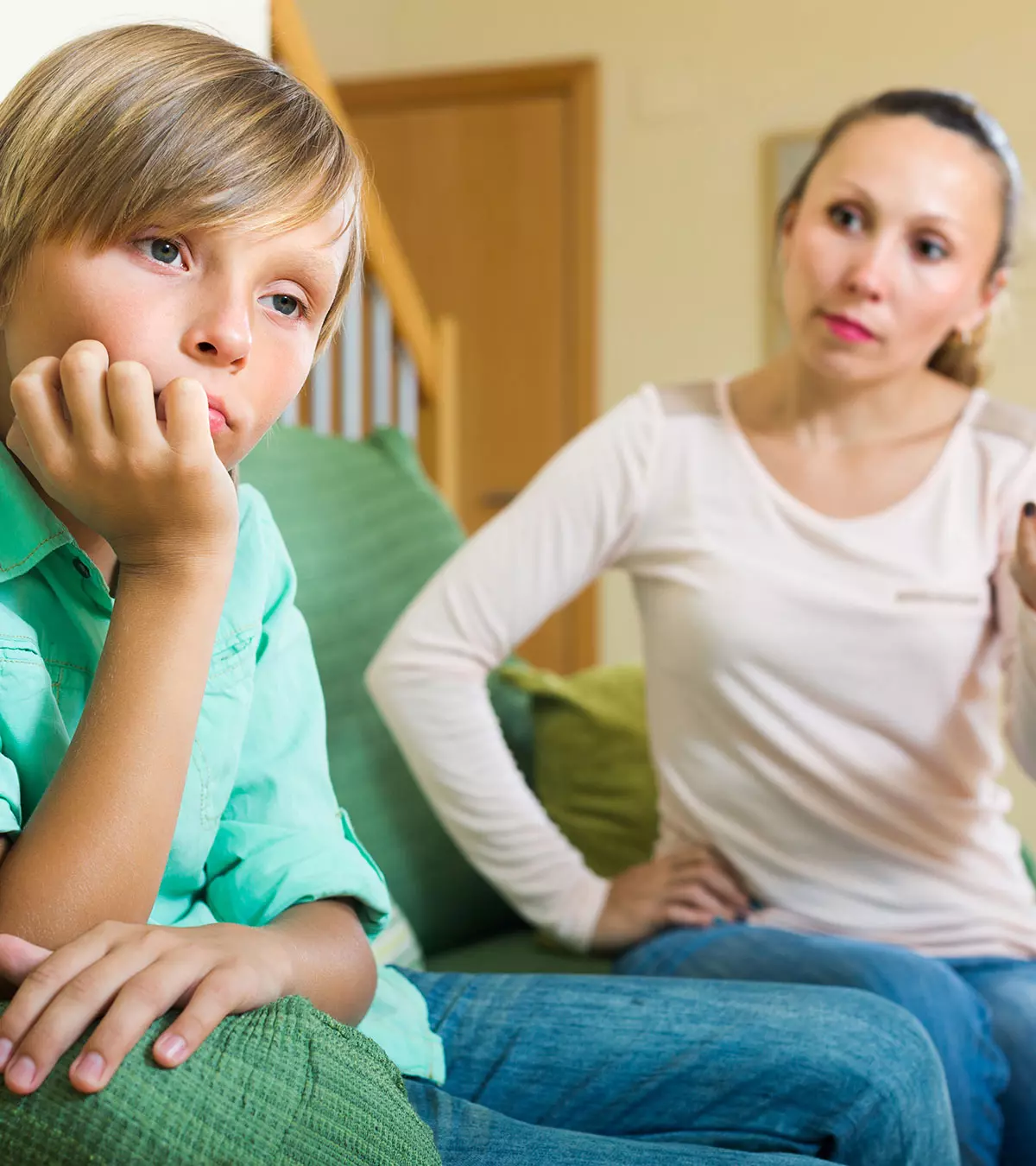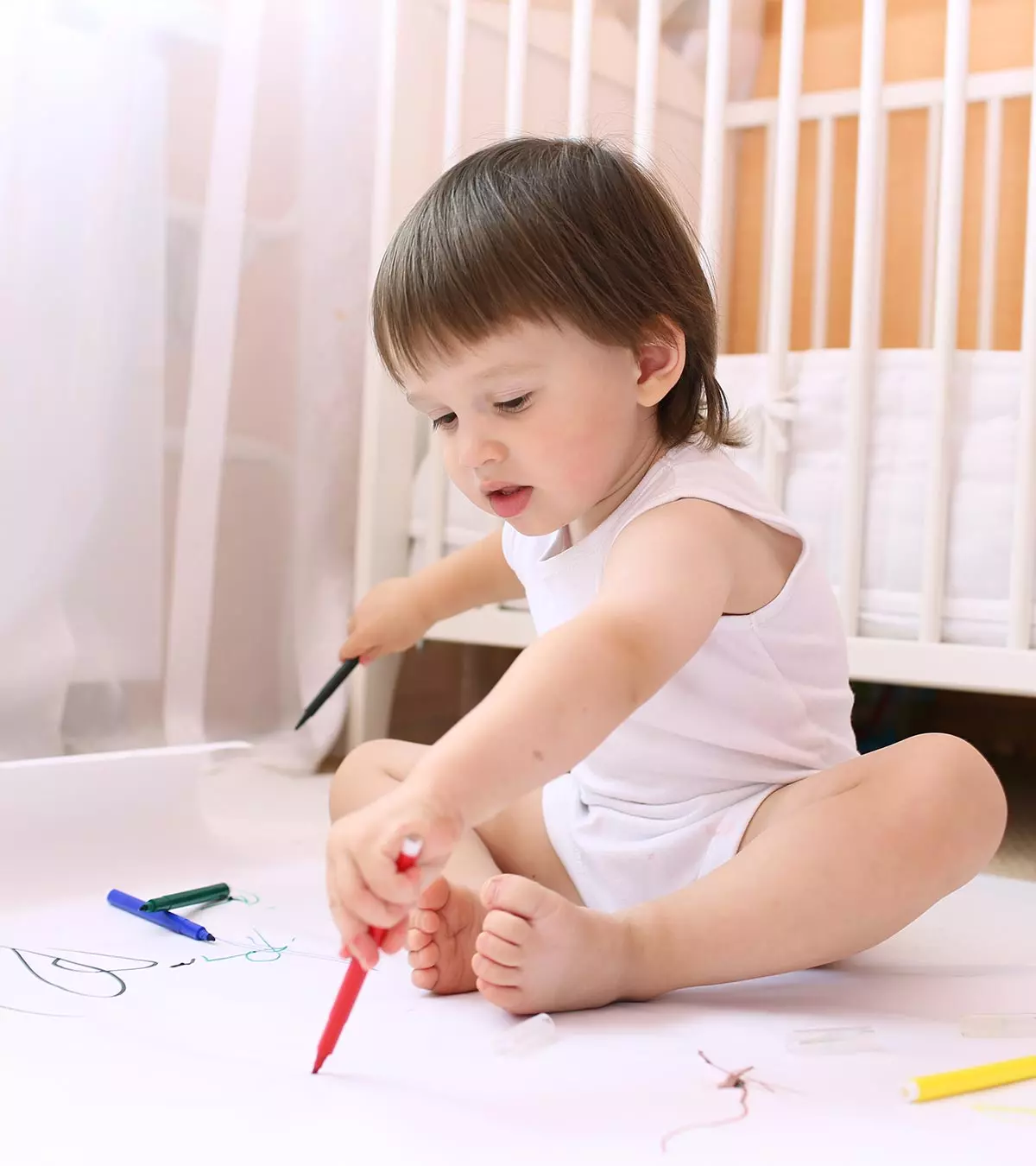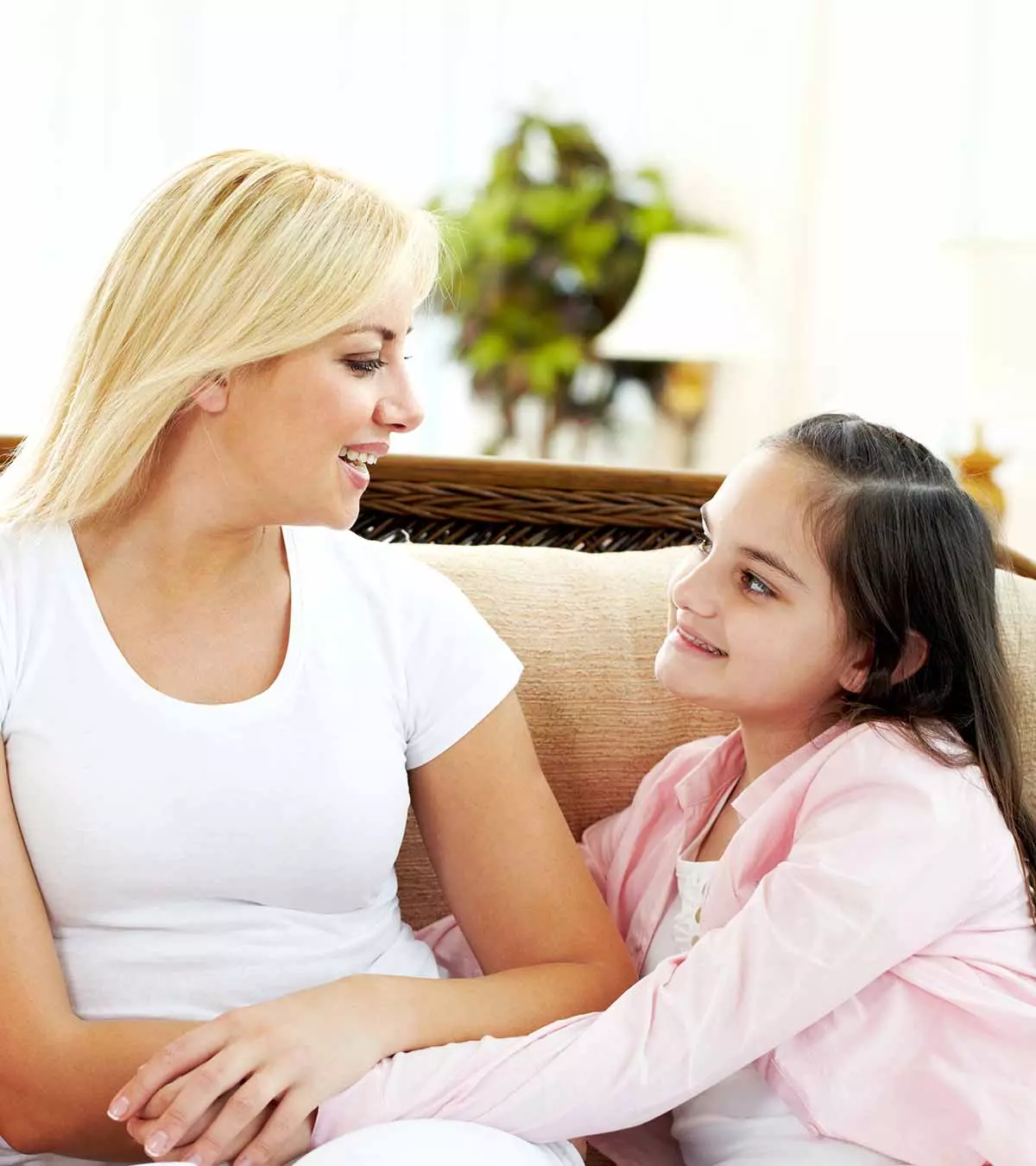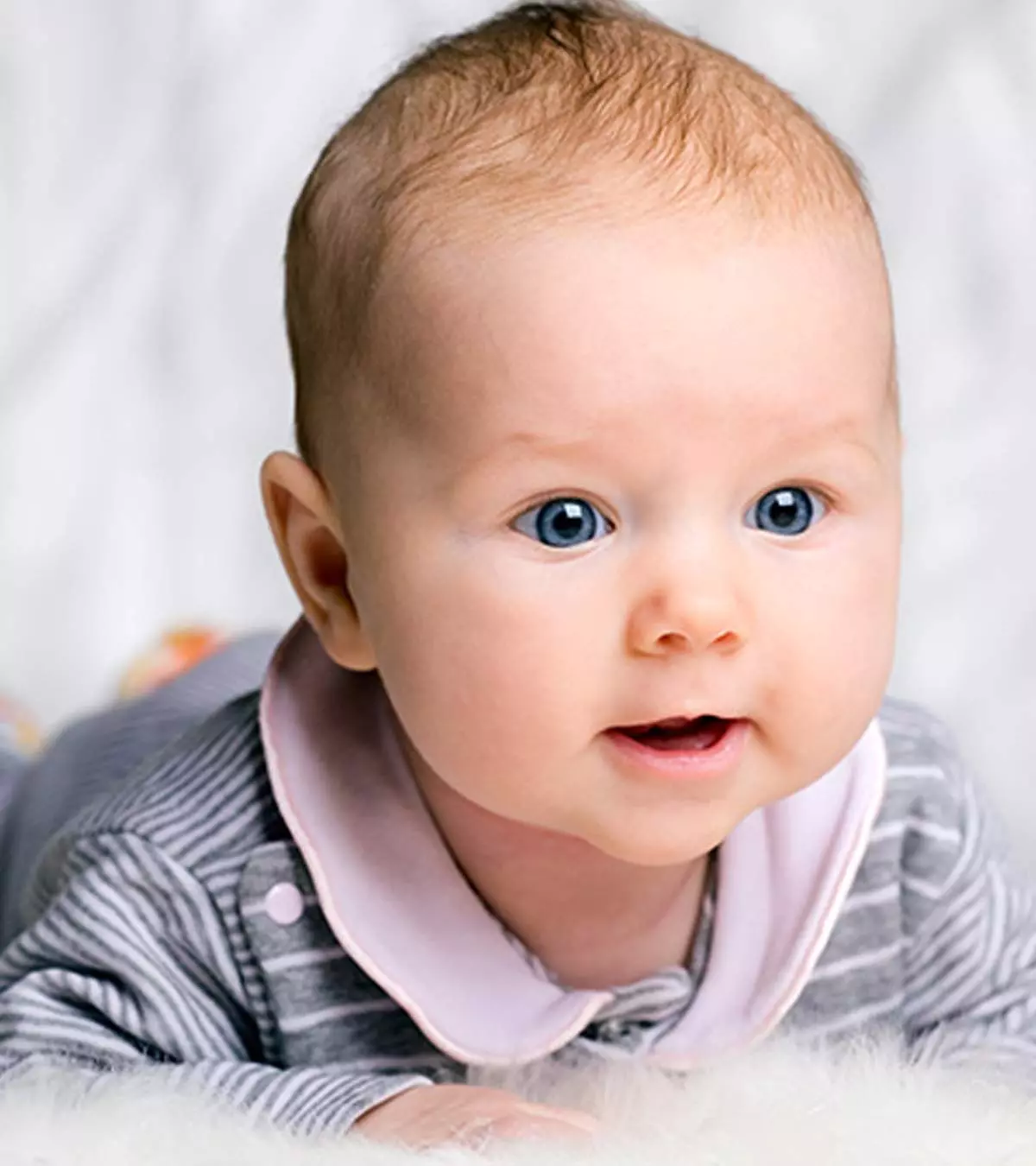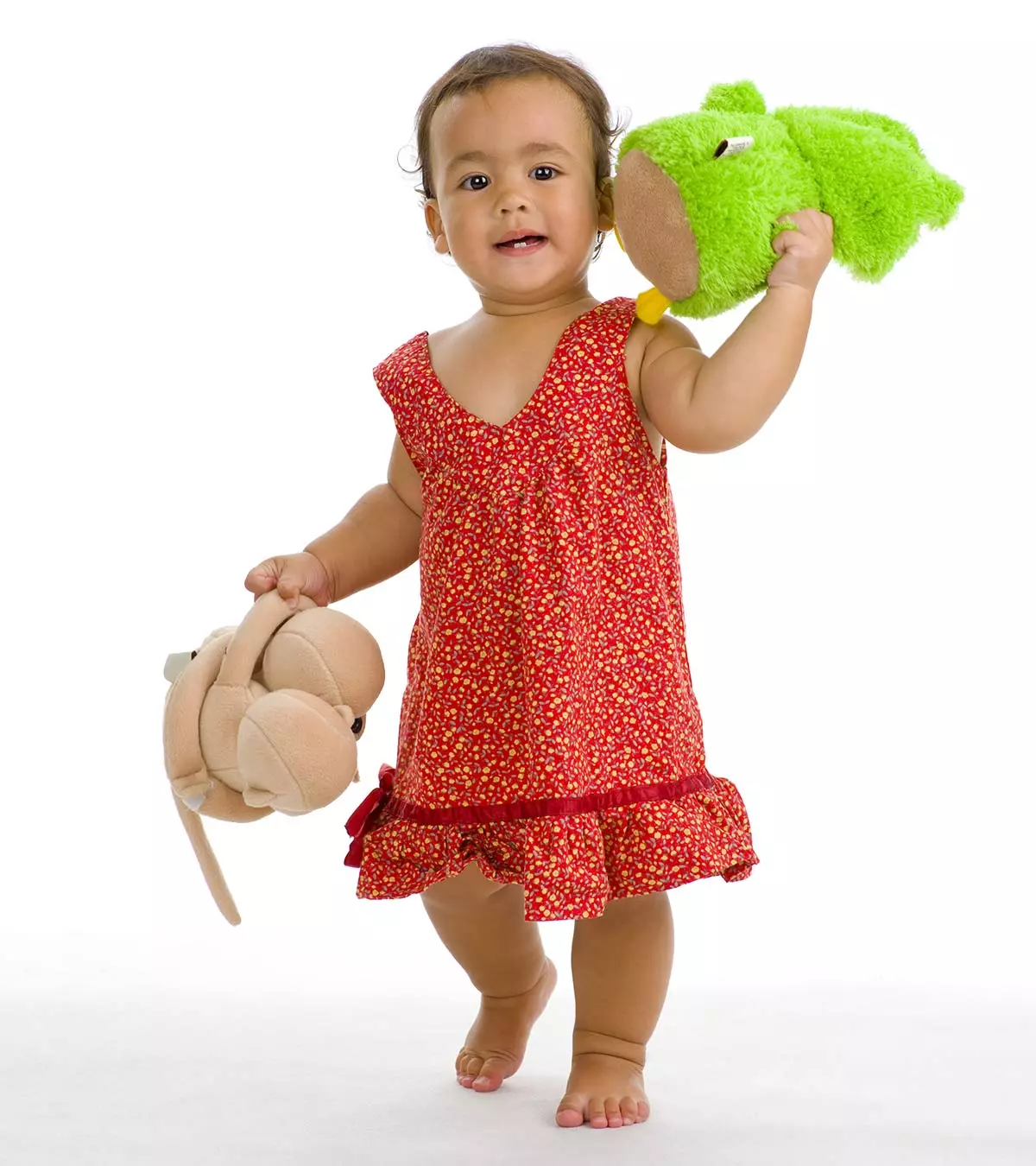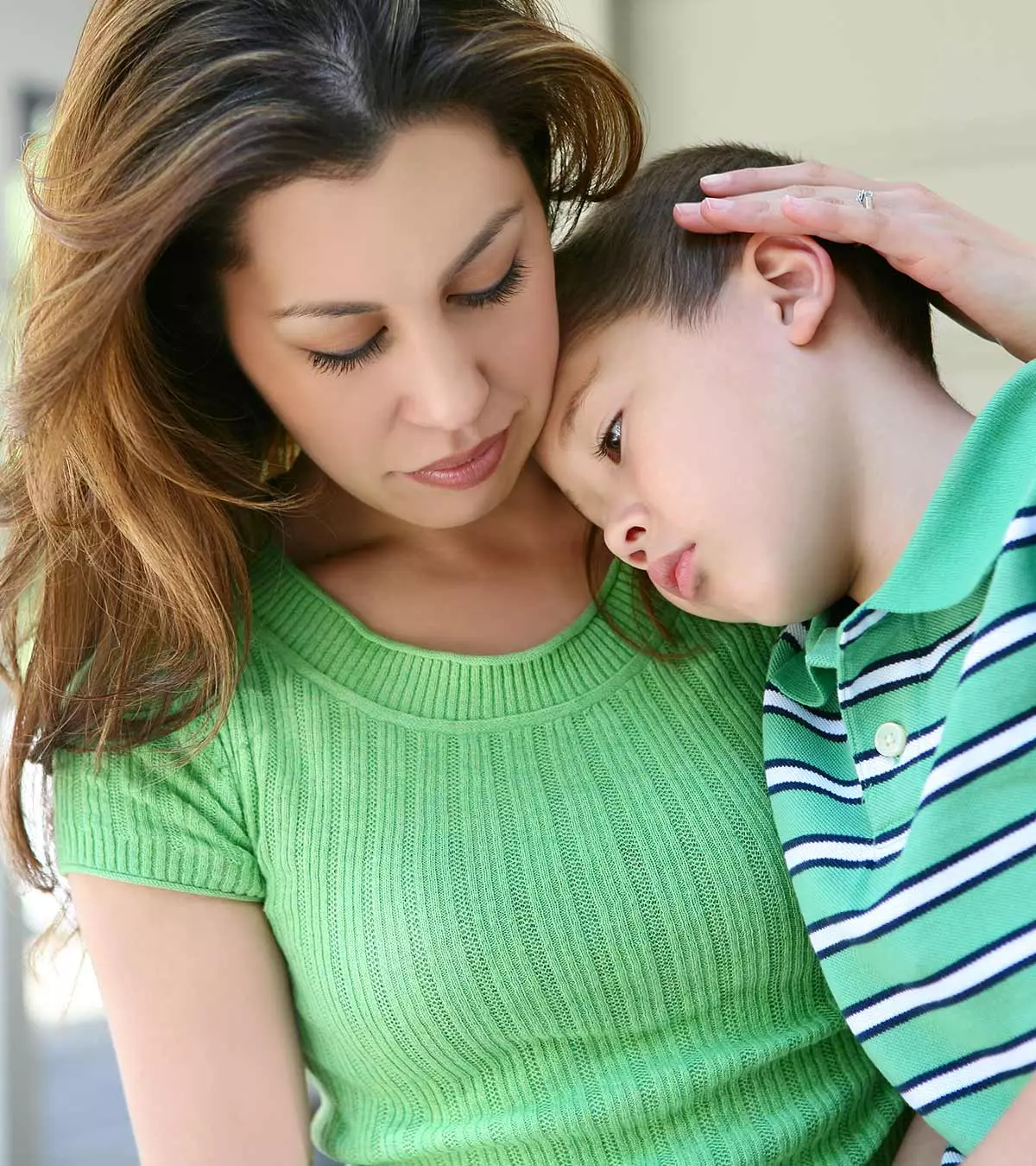
Image: Shutterstock
Sensitive children may often be seen as shy or fearful; however, this might not be true. They have different characteristics that set them apart from other children. A highly sensitive child may be more aware and reactive to their surroundings. You may find them to be emotional, empathetic, well-mannered, polite, and curious. They may also take situations personally or regret failures. These children need love and support from their parents to stay confident about their abilities. If you have a sensitive child, it is important to pay attention to their feelings and behavior and keep appreciating them for who they are. Early recognition of the traits of a highly sensitive child is essential to providing them with the care and attention they require. Read on to recognize the signs of sensitive children and the different ways to help them.

Key Pointers
- Highly sensitive children are more vulnerable to overwhelm and tend to pick up on others’ emotions and sentiments easily.
- A highly sensitive child may display traits like being emotional, taking things personally, asking lots of questions, and exhibiting a challenging personality.
- Effective ways to support such children involve validating their feelings and allowing them to express their emotions without pressure to change.
- Providing a nurturing, accepting, and secure environment can enable highly sensitive children to develop their self-esteem and confidence.
- It is important as a society to refrain from criticizing or lecturing the parents of a highly sensitive child.
Signs Of A Highly Sensitive Child
A highly sensitive child, as the name suggests, is more susceptible to the people and situations around them. Here are a few highly sensitive child traits you may notice in your child.
Highly sensitive children are often intuitive and perceptive, but since they are impressionable, they can also be delicate and fragile. As a parent, it’s important to be responsive to their needs (1).
1. Reacts emotionally
Your highly sensitive child will react emotionally to almost everything. A simple visit to a pet store could leave them feeling miserable for the animals there. A stern look from you could reduce them to tears, as they are tender-hearted. Being highly sensitive also makes your child empathize with others. They may feel so bad about others’ problems that they want to go out of their way to help them. They may worry too much about others and want to make things right for them (1) (9) (10).
Julia Ubbenga, a mother of two, realized that it was her little daughter’s nervous system and her sensitivity that made her act out the way she did. She says, “Understanding how her nervous system worked finally made me understand why, at wedding receptions, she continually ran to the bathroom to take a break from the loud music; why she would yell when her baby sister cried; why she’d meltdown when I started the blender without warning her first; and why she expressed her emotions so intensely, whether happy or upset (i).”
2. Broods over failures
If your child is highly sensitive, they will delve deeper into things than most other children of their age do. For your child, a simple event like failure to achieve a particular target will not be just that. They brood over the matter, thinking about why they did not realize the mistake in time and what they could have done about it. This could result in stress and anxiety (1).
3. Takes things personally
For your child, being highly emotional means that everything that happens is personal. Even a random comment by someone can cause them great distress. They could be touchy and will react to everything in a way where they feel whatever others say is applicable to them only (1).
 Be watchful
Be watchful4. Find it difficult making a choice
A common trait among highly sensitive children is the difficulty in making a decision. Your child will look into various details and subtleties, making it difficult for them to select. For instance, if asked to choose a flavor of ice cream, your child will take a long time to decide. In certain cases, they may find it difficult to choose, even something as simple as choosing a partner in a game (1).
5. Feels guilty
If your child feels that they have made a wrong decision they may feel guilty. They will ponder for a long time about the reasons. No matter what you say or do, they might not stop thinking about it for a while (1).
6. Displays a tough exterior
You have to be careful about what you speak or do to your highly sensitive children. They may be mad at you for a month just because you said or did something wrong. They may be hurt by something you did or said and will simply hold on to it rather than expressing it to you.
7. Is well-mannered and polite
Sensitive children are often quite well-behaved and conscientious. They may prefer calm and structured surroundings, as they may feel more comfortable and secure in such settings. Their concern about how others perceive them can lead them to behave politely with others. Moreover, they have the tendency to internalize the moral code and find it difficult to engage in activities that may lead to disapproval (2). Therefore, they are highly likely to behave in a manner that’s morally right, especially in the presence of others.
8. Reads people well
Sensitive kids have a keen sense of observation and know people well. They observe character traits and gather an accurate story of who the person is (9).
9. Loves animals

Kids who are sensitive develop a special bond with animals wherein they trust them completely. It’s not just trust they are also sensitive to the needs of animals and take extra care of it.
10. Asks a lot of questions
Highly sensitive children generally ask a lot of questions. At times the questions can be irritating and may be personal. But in general the questions may leave you with a sense of positive thought (9).
 Point to consider
Point to consider11. Can be calculative and take firm decisions
Sensitive children generally make decisions after thorough contemplation. Once they have made a decision, they usually stand by it, even if they are alone. For instance, they may take a long time to decide on a flavor of ice cream, but once they do, they stick to their decision and enjoy the ice cream to the fullest.
12. Feels accountable and admits their mistakes
Sensitive kids not only try to study their environment but also continually evaluate themselves and keep their emotions in check. If they feel they have made a mistake, they don’t hesitate to admit it, and they always appreciate others for small acts.
13. Thinks deeply
A highly sensitive child thinks a lot and pays close attention to everything. They even overthink trivial matters. They may ask deep questions, care much about others’ feelings, and understand things beyond their age. These children often have strong imaginations and enjoy time alone to think. However, they sometimes get too involved and waste their time and energy. They might notice even small changes around them and show empathy towards others. These kids benefit from a caring environment that appreciates their thoughtful nature and encourages growth (10).
Traits Of A Highly Sensitive Child
If you are the parent of a highly sensitive child, you may recognize some traits in them. Here are a few common habits that highly sensitive children often display (9) (11) (12):
- Highly sensitive kids think with their heart, as they sympathize with others. Logic doesn’t apply.
- They are talkative and would like to be appreciated by their peers. But when people offer them a negative comment, they may be easily offended.
- These children prefer to be alone, and spend more time by themselves.
- They work hard to ensure that they are perfect in their work.
- They trust their instinct while making a decision.
- Sensitive kids have a keen sense of observation and understand people well.
- They love animals.
- They have an extremely inquisitive nature and tend to ask a lot of questions.

- These kids do not like horror movies, strong smells, intense individuals, loud environments, and certain textures that they find overwhelming.
- While they prefer to work alone, they can also be good team players due to their keen sense of humor.
- They like to work in closed environments where they are not visible to others.
- They prefer slow and calm conversations in soft tones over sudden noises and harsh discipline.
 Did you know?
Did you know?Factors Contributing To High Sensitivity In Children
The exact cause of high sensitivity in children is unknown. It is believed to result from a complex interplay of genetic, environmental, and neurological factors (3).
- Neurological factors: Differences in brain structure and function among children can influence how they process sensory information (3). Sensory processing sensitivity or SPS is an innate personality trait characterized by a high sensitivity to various stimuli, including emotional, sensory, and social cues. Research shows that individuals with high SPS display heightened sensitivity to internal and external stimuli.
Being recognized as a highly sensitive child all her life, Shawna O’Neal describes what triggers her. She observes, “Sensitivity is sometimes a side effect of other mental struggles. This includes situations where we’re feeling very strongly about a situation, or we’re reacting to something that feels like a very BIG deal. These are situations where our emotions seem to match the severity of the situation, and in our own mind we feel we’re reacting appropriately. When we’re told to “lighten up” it’s because we’re feeling very strongly about something that others simply don’t see as significant (ii).”
- Genetic factors: According to research, “SPS (sensory processing sensitivity) is heritable (around 45%) and common, with around 20 to 30% of the human population considered high in SPS (also “highly sensitive”) (4).” Although not deterministic, the likelihood of a child becoming sensitive may increase if one or both of their parents are also highly sensitive.
- Environmental factors: Early experiences with parents and caregivers play a vital role in influencing a child’s sensitivity levels. The environment in which a child is raised also affects them. For instance, a child raised in a negative environment, like a home full of constant arguments, fights, and stress, is more likely to have negative outcomes. On the other hand, the child will happily grow and flourish if they are in a positive environment, like a home with loving, caring, and supporting parents (5).
How To Help A Sensitive Child?
As you probably know already, parenting a highly sensitive child demands care and attention. Follow these tips to handle their tactfully:
1. Acknowledge their feelings
- Your kid has a high range of emotions running, and you have to tune in as a parent. Understand your child’s feelings. It is one of the first steps you need to take when you want to adopt the right parenting approach toward your highly sensitive child.
- Your child may feel emotional all the time, but remember the instances when you felt hurt and someone failed to understand that. Let your child know that you understand what they feel.
According to Ubbenga, letting your children in on your similar childhood experiences may help them feel seen. She adds, “Expressing empathy to our daughter when she’s upset almost always helps her calm down. Sharing stories from my childhood about an experience similar to whatever she’s experiencing at that moment takes her from feeling upset to feeling understood.”
- Emotional awareness is important for highly sensitive children. Encourage them to express their emotions through journaling or art. This approach gives them a safe way to release their feelings and understand their emotions better.
2. Don’t try to change them
- For you, it may not be a great thing to be highly sensitive, but for your child, it is a way of life. As a parent, you may worry that being highly sensitive can hurt your child most of the time. It is perfectly understandable. But you also need to realize that this trait is not something your child can just delete.
- If you try and force your child to change, it will only make them retract into their shell. They will think you disapprove of their behavior, and it will make them feel more guilty and quiet.
- Accept and love your child the way they are. Make them feel happy and proud, and not feel like a misfit.
3. Reassure them
- Tell your child that you love them no matter what. Use your words and actions to show your child that you love them just the way they are.
- Your child may sometimes feel they are different from others, and it can be quite a dismal thought for them.
4. Encourage positive traits
- Some children can be rude and single out your child for being highly sensitive. Help your child to overcome these issues by highlighting their virtues.
- Show them how they can use their skills to their advantage. Tell them that being sensitive is good because they feel for others. Not everyone can do that.
- Your child may have an amazing imagination, they may be extremely creative, can be a wonderful listener, may perceive things much better and have a host of skills that not all children have.
- Help your child to realize these qualities and help them hone them more.
 Point to consider
Point to consider5. Guide them slowly

- Your highly sensitive child may find it very difficult to make certain choices. Your child may want to stay out of difficult or unfamiliar situations. They may not want to interact in a social gathering and be exceptionally shy. Help them face these social situations by guiding them in their interaction with others.
- If you feel you are not able to convince them, do not punish them. Speak to them and discuss your concerns. Tell them why you feel doing things a certain way can help them. Your highly sensitive child will understand your logic much better than other children of his age. Share with them all the reasons you have for asking them to follow your advice.
- Your child may not show any immediate improvement, but they may evolve gradually.
6. Take baby steps and work as a team
- Your support can help your child in a big way. Parenting the sensitive child includes a lot of support. There will be many instances where your child will highly benefit from your role as a partner rather than just a parent.
- For instance, your child may find it difficult to make friends in a new school or class. Help them out by planning individual interactions. You can arrange for separate play dates at your place where your child can interact with one or few new friends. It will help them gradually break the ice and get more comfortable and confident.
7. Don’t apologize on their behalf
- As a parent, you may sometimes apologize on your child’s behalf when you feel they are not socially comfortable. Stop apologizing on behalf of your highly sensitive child if you feel they made a social mistake. Understand that they are finding it challenging to adjust and are having a difficult time.
- If you apologize to others for your child’s behavior, it immediately sends out the wrong message. Your child will feel that they are a cause of embarrassment for you. Eventually, this may make your child an introvert, and they may feel uncomfortable discussing their feelings with you later.
- Accept your child the way they are and support them in a crowd.
8. Plan ahead
- Sudden situations can be very difficult for your highly sensitive child to handle. Parenting a sensitive child in this situation can be done the this way:
- You already know that your child does not like big interactions and social gatherings. Hoping that maybe it will work and planning something without their knowledge may prove a disaster instead of a success.
- It is good to first plan out things with your highly sensitive child. Sit down with them, and take them through all that you are planning. Tell them why you feel he should go ahead with it even if they feel uncomfortable. Tell them about all the fun you can have together and how much he and everyone else will enjoy it.
- Tell them they can always take a break with you in the middle of the event if they do not like it. Ask your child if they would like to help you plan things. Involve them in the preparation activities to help them cope with the situation.
- Remember that some things might not be in your control. For instance, while on a trip to the grocery store, you might suddenly meet someone who might want to talk to you. For such instances, teach your child calming techniques to occupy themselves.
9. Teach your child how to manage a crisis
- Your highly sensitive child may often not be able to cope up with a social situation. Even though you are always by your child’s side, there may be times when they have to manage alone. It could be in school, in class or at the house of a friend or relative.
- Teach your child ways in which he can calm down and control his anxieties. Repeating ‘it’s okay, I can handle this’ or ‘it will be over soon’ and ‘I can do it’ can help them feel better. Teach them to chant these magical words softly. Such positive affirmations repeated daily and during times of stress can help the child deal with the situation better.
- Also, teach your child some simple deep breathing exercises. It will help your child during sudden panic attacksiAn act of intense fear due to a previous threat that leads to physical reactions. or anxiety episodesiEpisodes of sudden fear or terror based on a perceived threat to a certain situation or event. , when you may not be around to help them.
10. Stay calm
- It is an extremely crucial parenting mantra. It is normal that you may sometimes lose your cool as a parent, especially when all your efforts to help go waste. Understand that being highly sensitive is not a condition but a personality trait. You just need to learn to start looking at things from their perspective.
- Do not feel guilty if your best strategies are not working. Stay calm and give yourself some time. Take a break and ask your partner for help, especially if you feel you may lose your temper. Walking out of the situation for a short while will help you overcome your own feelings and look at the problem objectively.
11. See sensitivity as a gift
- Sometimes it is frustrating when your child is unable to handle situations or is crying a lot or avoiding social gatherings. You need to empathize with their situation and identify their talents. Sensitive children are often gifted with various arts and skills; you just have to help them identify their potential and help them with it. Tell your kids about famous people who have their traits.
12. Focus on strengths
- Remembering how your child is talented or how he handles situations is important. This way if you can be aware and accept their challenges, you can help them to train themselves to be more confident. Talk to your kid about the positive aspects of being sensitive.
13. Consider their unique mental status
- Highly sensitive children feel everything more acutely than others. Remembering this can help you deal with their meltdowns and tantrums more effectively.
- Do not expect them to always behave according to a set list of rules. Give them some flexibility to adapt and modify according to new situations.
14. Set realistic expectations
- No matter how much you plan, you may still come across situations that are not in your control. For instance, on the way to the supermarket, you may encounter a traffic jam with excessive honking. This may distress your highly sensitive child and trigger a meltdown.
- Acknowledge their feelings and validate their emotions. Whenever possible, prepare the child for potential challenges, but be flexible to accommodate their mood swings. Psychotherapist Ehab Youssef suggests, “Sensitive kids feel things deeply, and when their emotions are dismissed with statements like ‘You’re too sensitive’ or ‘It’s not a big deal,’ it can make them feel misunderstood. Instead, try saying, ‘I have noticed that this is really affecting you. Let’s talk about it.’”
- Since you can’t predict every situation and prepare for it, set realistic expectations both for your child and for yourself.
15. Lead by example
- Children learn a lot from their parents. They pick up even the smallest actions and words. If your child is highly sensitive, they might be more attuned to your actions than you may think. Hence, it is highly recommended to watch what you say or do in front of your child.
- Model appropriate behavior. For instance, if you are angry or distressed, try deep breathing or counting instead of shouting. Your child will notice this and may practice the same when they have similar emotions.
How to Prevent Your Sensitive Child from Being Bullied?
Understanding that your child is sensitive and ensuring they are shielded from bullying is crucial and challenging. Here are some comprehensive steps that parents may consider:
1. Develop their confidence
Unconditional love and support from parents and other adults helps a child to build confidence. It gives them courage to share their fears with you. You have to teach them to stand up for themself, and at the same time protect and encourage them in every possible way.
2. Make sure they feel safe
Take time to discuss the various things your child faces at school. Talk to them regarding their teachers, peers and their academics. If they are being bullied, teach them how to handle the situation. It is often suggested that they go to an adult for help in such circumstances. Try not to misguide them by telling them to avoid or run away from bullying.
3. Count on friends

Highly sensitive children find it difficult to be part of groups. Children in a group aren’t bullied as everyone is there for the other. It is important you tell the child the importance of having a friend and help them identify a good friend who will understand your child’s sensitive condition.
4. Help them stay physically fit
Children who are active in sports are physically fit and also have more confidence than the other kids. As a sensitive child may avoid team sports, it is important you train them to be fit individually. Physical exercise helps them become healthier, stronger and confident. When they exercise regularly and are physically fit, their confidence will be high, which will help them handle their sensitiveness. Also, they won’t be depressed or get offended easily.
5. Boost their confidence
A weak child will always be an easy target for bullying. When peers comment on their physical appearance, an extremely sensitive child can be easily offended and become depressed. However, a confident child can handle their sensitiveness. Tell your child how special they are and that you love them no matter what. This will boost their confidence to a great extent.
 Be watchful
Be watchfulThings The Parent Of A Highly Sensitive Child Doesn’t Need to Hear
Parenting a highly sensitive child comes with different challenges and misconceptions. Hence, one must be careful of what they say to a parent tending to a highly sensitive child and how it may be perceived.
Here are some things that parents of highly sensitive children often don’t need to hear:
1. “If you want to sort them, give them one for good”
The last thing the parent of a highly sensitive child would do is to punish them or try hitting them. It would trigger an adverse effect. Things like raising voice against the child will harm their tender heart immeasurably.
2. “Make them attend social events and they will learn”
Busy activities can be too much to handle for highly sensitive children. It might take weeks for them to become normal after such events. Instead, when we respect their privacy, it will send them a positive message that we understand their boundaries. Such empathy will help them to become social with guidance.
3. “Leave them by themselves and they will come around”
The issues which are troubling an extremely sensitive child are real. Leaving them by themselves in such a situation will only worsen the situation. If a child is not able to adjust to a new dress or a new environment, the thought will constantly be on their mind until you act and help them to get over the thought.
4. “They are getting too personal”
Highly sensitive children take things to their heart and easily get involved emotionally. It takes time to teach them not to be so and things just won’t happen over a day. Discarding their feelings with conclusions is never helpful.
5. “They need to be involved in the team”

Highly sensitive children often find it difficult to participate in team games as they feel stressed out due to competition. At times, team games may involve elements where they can be teased, or they may not be confident. Forcing them to play such sports will only damage their self-esteem and leave a permanent mark in their lives. Sometimes team games do help them to boost their confidence. If an extremely sensitive child is not a team player, you can encourage them to participate in sports which he can play individually.
6. “It is just a thing that they are afraid of”
The fear experienced by highly sensitive children is real, however petty it may seem. If they are alarmed or scared of anything, always acknowledge their fear and build confidence in them to face it. Talk to them on how they should overcome their fear.
7. “Toughen them up”
A highly sensitive child struggles to cope up with the surroundings. Do not be insensitive by making attempts to “toughen them up”. They might feel insecure as they can’t be who they are and lose their individuality. Giving them guidance on how to handle situations and taking care of them will gradually help them cope up with them.
Pediatrics psychologist Dr. Ann-Louise Lockhart shares her observations, saying, “You might have heard from family and friends to “toughen them up.” This, in fact, doesn’t work. Being overly hard on a highly sensitive child actually creates the opposite effect. It tears them down, leads to them second-guessing their decisions, causes them to feel overly sensitive to criticism, and can lead to anxiety or depression (9).”
8. “They are a cry baby”
As mentioned above, highly sensitive children take things to heart. Under uncomfortable situations, they find it too hard to hide their tears. You should empathize with them and understand their real feelings. Give them tools to cope up with situations rather than ridiculing them for their tears.
9. “They have to adjust however distracting the environment may be”
An extremely sensitive child who is trying to cope up with the environment of the school or a group will find it highly difficult. Sometimes, the teacher may simply suggest that they have to adjust like the other students. But for a highly sensitive child, the problem is real and being in a distracting environment would simply worsen their feelings.
10. “Is it them you are talking about as they are not that kid”
Highly sensitive children may show positive behavior at school but throw up a tantrum at home. It is because they know that their parents will understand them, and in school they have to manage themselves. Teachers may not understand that your child behaves that way at home.
If your child is highly sensitive, you are lucky to have such a caring person in your life. Not all children can think about others the way your child can. Be proud of your highly sensitive child, and show them and the world that you are a lucky parent. Team up with your child and be their biggest supporter. Remember, parenting a highly sensitive child can be challenging, but it’s also highly gratifying.
Frequently Asked Questions
1. Is being a highly sensitive person genetic?
Being a highly sensitive person (HPS) depends on several factors, such as environment, genetics, and childhood experiences (1). According to research, “SPS (sensory processing sensitivity) is heritable (around 45%), and common, with around 20%–30% of the population considered high in SPS (also “highly sensitive”) (2).” SPS is an innate personality trait characterized by high sensitivity to environmental and social stimuli.
2. Do highly sensitive people need more sleep?
Highly sensitive people are too sensitive to even subtle environmental changes. They process more sensory information than usual, which can make them feel overwhelmed and exhausted. To recover from this sensory overload, they require longer sleep times than those who aren’t hypersensitiveiA condition of being over-sensitive to any form of external stimuli. (6).
3. Can highly sensitive children outgrow their sensitivity?
Highly sensitive children have a temperament characterized by heightened sensitivity to various stimuli, including emotions, sensory experiences, and environmental factors. The degree of sensitivity can vary among individuals, and some children may learn coping mechanisms and strategies to manage their sensitivity as they grow older. As a result, they can develop resilience and better ways to handle overwhelming situations with guidance and support.
4. What are some common misconceptions about highly sensitive children?
There are several common misconceptions about highly sensitive children. While some highly sensitive children may be shy, it is not the defining characteristic of their sensitivity. Highly sensitive children are not necessarily weak or fragile. Their sensitivity does not imply a lack of resilience or the inability to handle challenges. A common misconception about highly sensitive children is that they overreact to situations and may become a sulking child. While they may respond more intensely to certain situations, such as loud noises, crowded places, or changes in routine, their reactions might seem exaggerated to others.
5. How can I create a safe space for my highly sensitive child?
To make a comforting and secure environment for your highly sensitive child, reduce sources of overwhelming stimuli like loud noises or busy settings. Provide a calm, quiet spot where they can relax and recharge whenever they feel overwhelmed.
Having sharp observational skills, refraining from making decisions or accepting failures, being inquisitive, quiet, and overly emotional are typical signs of a highly sensitive child. These children like spending time alone, with nature, or with animals. They are very reactive, empathize and comprehend other people’s feelings and are not logical thinkers. If you think your child is a sensitive one, you could help them deal with their emotions while being calm and sensible, learn how to develop good habits in a child, and not over-expect or try to change them instantaneously. Take it slow, be supportive, and encourage them to hone their positive attributes.
Infographic: Effective Ways For Parenting A Sensitive Child
A sensitive or highly sensitive child can feel and get involved in more emotions than other children. These children can be highly aware of their surroundings and feel more empathic, making them vulnerable to bullies. Therefore, the following infographic has provided some right parenting tips for handling a sensitive child.
Some thing wrong with infographic shortcode. please verify shortcode syntaxIllustration: Signs Of A Highly Sensitive Child And Tips To Help Them
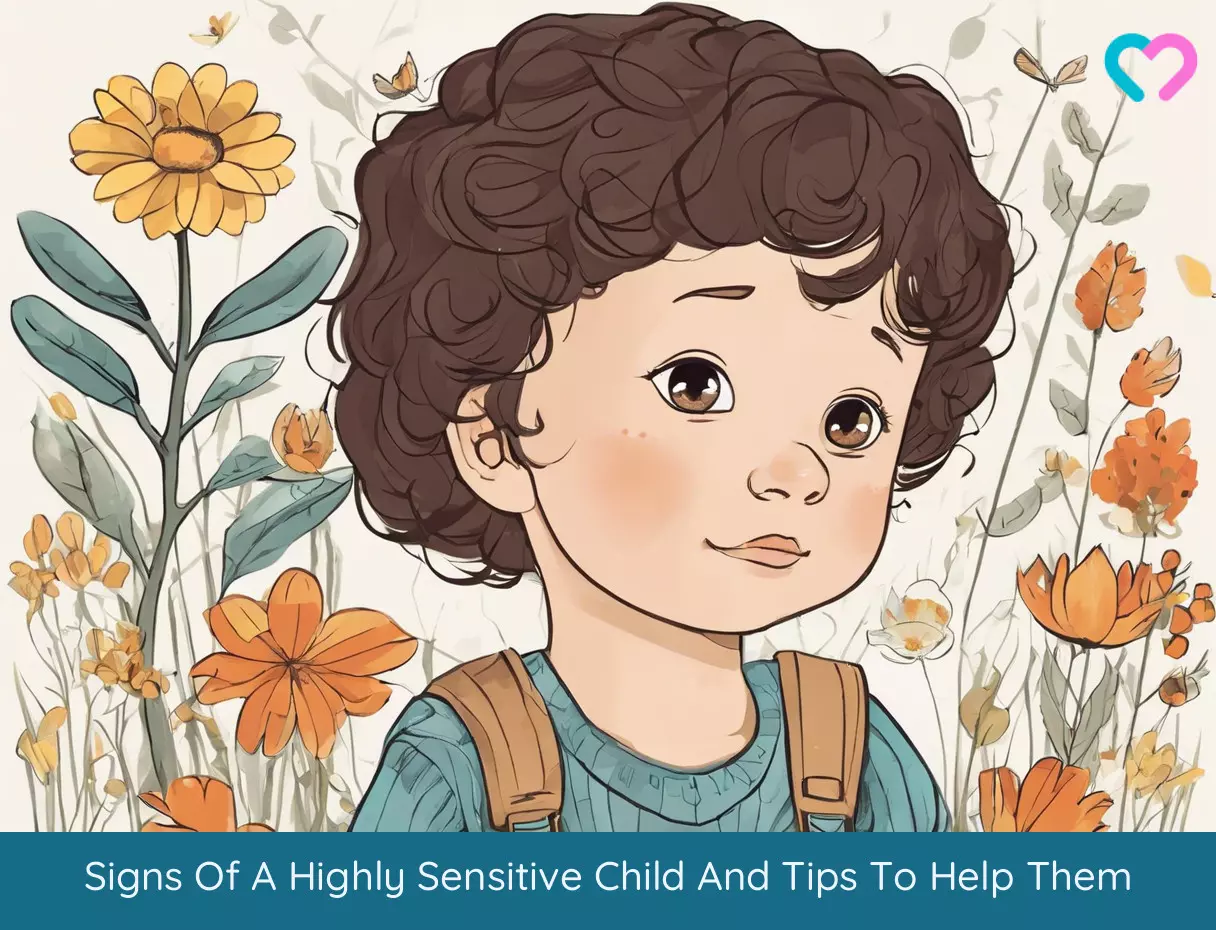
Image: Stable Diffusion/MomJunction Design Team
Are you concerned about your child’s emotional sensitivity? Learn how to identify and support a highly sensitive child in this video.
Personal Experience: Sources
MomJunction articles include first-hand experiences to provide you with better insights through real-life narratives. Here are the sources of personal accounts referenced in this article.
i. Is Your Child Highly Sensitive? Mine Is, and It Changed How I Parent;https://highlysensitiverefuge.com/is-your-child-highly-sensitive-mine-is-and-it-changed-how-i-parent/
ii. I was a ‘sensitive’ kid, here’s what I’ve learned as an adult;
https://cherrykoda.medium.com/i-was-a-sensitive-kid-here-s-what-i-ve-learned-as-an-adult-86611b28c371
References
- Supporting the development of Highly Sensitive Children.
https://highlysensitive.eu/wp-content/uploads/2025/07/IO7_ENG_v1.pdf - Monika Baryła-Matejczuk, Małgorzata Artymiak (2025); The Highly Sensitive Child as a challenge for education – introduction to the concept.
https://www.researchgate.net/publication/342740582_The_Highly_Sensitive_Child_as_a_challenge_for_education_-_introduction_to_the_concept - The Highly Sensitive Child As A Challenge For Education – Introduction To The Concept.
https://highlysensitive.eu/en/the-highly-sensitive-child-as-a-challenge-for-education-introduction-to-the-concept/ - Bianca P Acevedo et al.; (2014); The highly sensitive brain: an fMRI study of sensory processing sensitivity and response to others’ emotions.
https://www.ncbi.nlm.nih.gov/pmc/articles/PMC4086365/ - Sharell Bas et al.; (2025); Experiences of Adults High in the Personality Trait Sensory Processing Sensitivity: A Qualitative Study.
https://www.ncbi.nlm.nih.gov/pmc/articles/PMC8584340/ - Margarett Mcbride and Eva Telzer; (2025); Why Are Some Kids More Sensitive to Their Environments?
https://kids.frontiersin.org/articles/10.3389/frym.2025.00113 - Carlos V Rizzo-Sierra et al.; (2012); Higher sensory processing sensitivity, introversion and ectomorphism: New biomarkers for human creativity in developing rural areas.
https://www.ncbi.nlm.nih.gov/pmc/articles/PMC3409988/ - Michael M. Chouinard; (2007); Children’s questions: a mechanism for cognitive development
https://pubmed.ncbi.nlm.nih.gov/17394580/#:~:text=Children%20ask%20information%2Dseeking%20questions - How to Support Your Highly Sensitive Child.
https://www.pbs.org/parents/thrive/how-to-support-your-highly-sensitive-child - The Superpowers of Sensitive People.
https://greatergood.berkeley.edu/article/item/the_superpowers_of_sensitive_people - How You Can Help Your Highly Sensitive Child Manage the Strong Personalities of Others.
https://beechacres.org/how-you-can-help-your-highly-sensitive-child-manage-the-strong-personalities-of-others/ - Understanding and Supporting Highly Sensitive Children.
https://extension.usu.edu/relationships/faq/understanding-and-supporting-highly-sensitive-children
Community Experiences
Join the conversation and become a part of our nurturing community! Share your stories, experiences, and insights to connect with fellow parents.
Read full bio of Dr. Neema Shrestha

Michael Anderson is a licensed professional counselor and has felt led to be in this role since the age of 15. He is passionate about coaching and helping others become their very best and has experience in individual, group, marriage, and family counseling. Michael completed his undergraduate degree in Psychology at Liberty University and received his Masters in Counseling from Colorado Christian University.
Michael Anderson is a licensed professional counselor and has felt led to be in this role since the age of 15. He is passionate about coaching and helping others become their very best and has experience in individual, group, marriage, and family counseling. Michael completed his undergraduate degree in Psychology at Liberty University and received his Masters in Counseling from Colorado Christian University.
- Ehab Youssef is a licensed clinical psychologist, mental health researcher and writer at Mentalyc. He has done MSc in Psychology at the University of Groningen and worked as a psychotherapist in Luxembourg and Cairo. Ehab currently works as a psychology AI researcher at Mentalyc, where he applies his expertise in psychology and artificial intelligence to develop innovative solutions for mental health care.
 Ehab Youssef is a licensed clinical psychologist, mental health researcher and writer at Mentalyc. He has done MSc in Psychology at the University of Groningen and worked as a psychotherapist in Luxembourg and Cairo. Ehab currently works as a psychology AI researcher at Mentalyc, where he applies his expertise in psychology and artificial intelligence to develop innovative solutions for mental health care.
Ehab Youssef is a licensed clinical psychologist, mental health researcher and writer at Mentalyc. He has done MSc in Psychology at the University of Groningen and worked as a psychotherapist in Luxembourg and Cairo. Ehab currently works as a psychology AI researcher at Mentalyc, where he applies his expertise in psychology and artificial intelligence to develop innovative solutions for mental health care.
Read full bio of Sagari Gongala
Read full bio of Harshita Makvana
Read full bio of Apoorva K







